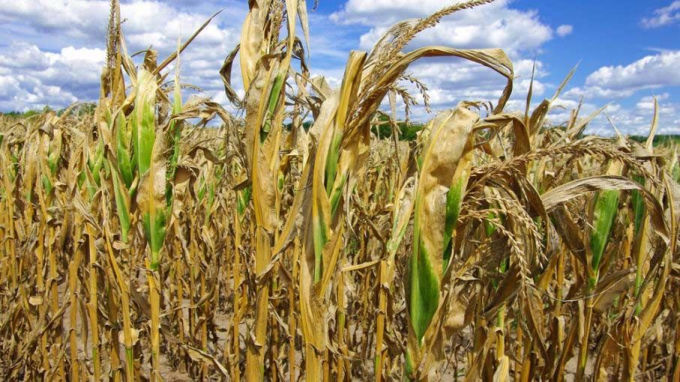November 27, 2025 | 20:32 GMT +7
November 27, 2025 | 20:32 GMT +7
Hotline: 0913.378.918
November 27, 2025 | 20:32 GMT +7
Hotline: 0913.378.918

Corn yields are expected to reach their lowest level in 10 years due to the lack of rain and a spell of high temperatures during late December and early January. Photo: SF
Fertilizer costs were already on the rise over the last few years, but this latest move by Russia — one of the world’s largest fertilizer exporters — could make things worse for U.S. farmers.
Russia had previously stopped exporting one type of fertilizer, ammonium nitrate, which officials there said was to protect its farmers from already high costs. But this latest move comes after Russian threats of retaliation over Western sanctions.
It’s unclear whether the export ban will include all countries, or just certain Western nations. Canada is a major supplier of U.S. fertilizers, but a decrease in the global market could still boost costs.
Matt Dorsey farms in south-central Idaho. He already had concerns about inflated fertilizer and gas prices before this announcement.
“It’s hard to even anticipate or guess the rise in costs at this point,” he said.
That doesn’t account for supply chain issues — or drought.
Sean Ellis with the Idaho Farm Bureau Federation highlighted yet another challenge: the labor force.
“Yeah, farmers are having a harder time now than ever finding labor,” he said.
Ellis said there is some good news: he hasn’t heard of any large movement to leave fields empty this spring. However, some farmers have said they will change what crops they grow.
Ultimately, Ellis said the increasing costs will lead to higher prices in the store, even if farmers don’t make any more money. That’s because higher costs are squeezing everyone along the supply chain, from farmers to distributors to consumers.
Russian sanctions impact local fertilizer prices
The latest supply chain shortage can be compared to the toilet paper shortage of 2020, but this time it could affect farms and your lawn.
The export ban in Russia threatens to reduce fertilizer supplies across the world, as growing season is just around the corner.
Russia is one of the top five fertilizer producers in the world, along with the United States.
Many farmers started to see prices increase last fall in Siouxland.
"Lots of people right now, wanting to make sure they get fertilizer, they wanted it last fall. This spring? They want it even more," said Dr. Chad Hart, a Professor of Ag Resource Economics at Iowa State University.
Dr. Hart says this has a snowball effect when it comes to individual households.
Many nations are not supporting Russia and are pulling operations out of the country due to its invasion of Ukraine.
These prices being on the rise are not a surprise.
Costs have crept up ever so slightly since the fall.
"Crop prices move higher, food prices move higher, fuel prices move higher, consumer good prices move higher," said Dr. Hart. "Everything is having to go higher to reflect these issues."
According to Grow Intelligence, prices for some fertilizers have jumped and continue to be forecasted to jump 13% - 32% since the Russian invasion began.
Some farmers are even doing daily soil tests ahead of planting.
"They're checking to see what nutrition is still available in the soil and only trying to add the additional amount that the crops are going to need," Hart said.
Sioux City fertilizer and lawn care business, Sharp Lawn Care, purchases fertilizer in the U.S.
Due to the global supply chain, the people at that business say they've felt the increase of those prices locally.
"Since the fall of last year, we've seen an average of 40% increase in fertilizer costs," said Lance Britton, President at Sharp Lawn Care, Inc.
Lawn fertilizer season starts next week.
"We try to provide the best quality products that we can to our clients, when they squeeze us we have very few options," Britton said.
Businesses are doing what they can to be more efficient to help keep costs down.
"We've increased our training a lot actually, about doubled our efforts on training, to make sure we're being as efficient as possible to make sure we're not wasting anything," Britton said.
Dr. Hart says cow manure is another alternative for farmers looking to enhance their soil, but those prices are increasing, as well.
(siouxlandnews)

(VAN) A new study reveals how the simultaneous effects of ocean acidification, salinity and loss of oxygen are making the world more fragile.

(VAN) Hopes are growing that the creation of the first 3D turkey gut model could be a turning point in the battle against the virulent blackhead disease.

(VAN) Tyson, America’s biggest meat supplier, plans to shutter one of its largest beef processing plants as the industry continues to struggle with low cattle supplies and political pressure from Washington.

(VAN) New FAO study shows how digital solutions are empowering farmers and fishers to prevent losses and build resilient agrifood systems.

(VAN) Brazil's COP30 presidency pushed through a compromise climate deal on Saturday that would boost finance for poor nations coping with global warming but that omitted any mention of the fossil fuels driving it.

(VAN) Poultry farmers in the UK have been warned that they could face one of the worst winters yet for bird flu.

(VAN) Prices of main-crop paddy have risen sharply, with jasmine rice hitting 16,100 baht per tonne — the highest level in years.